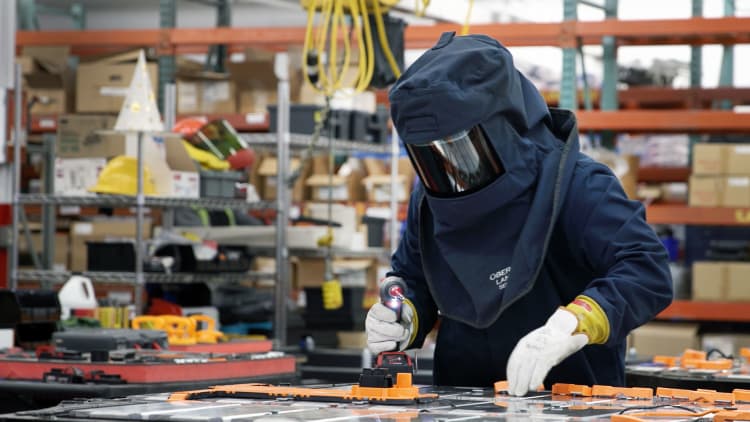The author paid a company, Renewable Recycling, to pick up and recycle his queen-size mattress in New York City.
Greg Iacurci
I paid $95 to recycle a mattress.
It may sound odd, silly even, to pay so much to dispose of a run-of-the-mill household item.
But the economics of mattress recycling illustrate why it can be difficult — and costly — to be an eco-friendly consumer in the U.S.
Americans discard about 15 million to 20 million mattresses each year, according to the Mattress Recycling Council. That’s an average of about 50,000 per day.
Most end up in a landfill, experts said.
Mattresses are “one of the hardest things to recycle,” said Alicia Marseille, a sustainability and circular economy expert at Arizona State University.
“It’s a massive waste stream,” she said.
‘It’ll probably be there for hundreds of years’
Mattresses at a garbage dump.
Robert Brook | Corbis | Getty Images
My mattress — a queen-sized hand-me-down from family and probably close to two decades old — was in desperate need of replacement. The average mattress has a lifespan of about 14 years, from manufacture to consumer disposal, according to MRC.
But what to do with it?
I live in Brooklyn, where residents can dispose of a mattress for free as part of routine trash pickup.
As someone who meticulously tries to cut waste in everyday life — avoiding single-use plastics, composting food scraps — it was painful to think of mine wasting away in a landfill.

“If you put your mattress in a landfill, it’ll probably be there for hundreds of years, just sitting there,” said Meg Romero, the recycling and litter control superintendent for Charles County, Maryland.
Surely, I can find a new home for it instead, I thought.
Wrong.
After two weeks of unsuccessful dispatches to local homeless shelters, organizations like The Salvation Army and Goodwill, and community forums like Buy Nothing and The Freecycle Network, I’d exhausted my patience for a free-giveaway option.
Individuals who donate a mattress to certain groups may be able to claim a tax deduction for its fair market value on their federal tax return. Taxpayers would need to itemize their deductions to benefit.
Did I neglect to reach out to some interested parties? Probably. Might someone else have different results? Yes. But my personal cost-benefit analysis dictated that it was time to ditch donations.
I researched some recycling options, and selected Renewable Recycling Inc., based in East Rockaway, New York. There are few other U.S. companies that do such work, experts said. A directory compiled by MRC lists just 55.
How a mattress is recycled
Mattresses are picked up and placed into a truck to be hauled to a recycling facility at the Prima Deshecha landfill in San Juan Capistrano, California, on March 10, 2022.
Mark Rightmire/MediaNews Group/Orange County Register via Getty Images
More than 75% of a mattress is recyclable, according to MRC. Some companies put it at closer to 90%.
Recyclers strip them of materials like wood, steel, and…
Read More: Why I paid $95 to recycle a mattress — and you might, too

